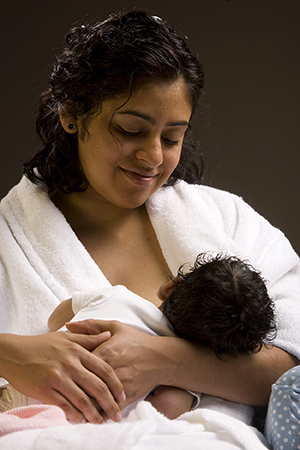Common Questions About Breastfeeding
Here are answers to some questions new parents often ask.

Is my baby getting enough milk?
When it comes to feeding your baby, what goes in must come out. You can tell how much milk your baby is getting by keeping track of the baby’s diapers:
-
By the first 24 hours after birth: The baby should have 1 to 2 wet diapers and 1 to 2 soiled (poopy) diapers. The poop will be dark, sticky, and tar-like (meconium).
-
The second and third day after birth: The baby should have 3 to 4 wet diapers and 2 to 3 soiled diapers. The poop will be greenish brown (transitional stool).
-
After the first 4 or 5 days: The baby should have at least 5 to 6 wet diapers and at least 3 to 4 soiled diapers a day. The poop will be yellow and loose.
-
Other signs your baby is eating well include gaining weight and being relaxed after most feedings.
How can I tell when my baby is hungry?
Don’t wait until your baby cries to feed them. Newborns should be nursed as soon as they show any hunger signs. These include:
-
Movement when waking
-
Increased alertness or activity
-
Nuzzling against your breast (rooting reflex)
-
Smacking lips or opening and closing their mouth
-
Moving hands to mouth, sucking on the hand or fingers
-
Crying (late sign)
How often should I feed my baby?
Feed your baby as often and as long as they want. Make sure you’re nursing at least 8 to 12 times per day. Some of these feedings might be close together (cluster feeding). And then your baby might rest for a few hours. Let your baby nurse as long as they would like. When done, they will stop swallowing, relax their hands, and fall asleep.
If your baby hasn't nursed in 4 hours, you may need to wake them and offer your milk. Newborns tend to be very sleepy and sometimes will not wake to eat. If your baby doesn't seem interested in nursing, place them in just a diaper against your bare skin (skin to skin) and continue to offer your milk.
If your baby fusses when feeding, don't worry. Some babies get distracted easily. To calm your baby, choose a quiet place for feeding. It may also help if you breastfeed in the same place in your home each time. If your baby is crying, it may be hard for them to latch on. Gently place your finger in the mouth to help them feel calm. Then offer your milk again.
Will I spoil my baby?
Newborns can't be spoiled. When your baby needs comfort, food, or holding, their crying will let you know. When you respond to your baby's needs, you help them learn to trust you. This is a time to shower your baby with love and attend to their needs.
What is a growth spurt?
Babies eat a lot. Their stomachs are very small when they are born, and breastmilk is easily and quickly digested. This is even truer during a growth spurt. Growth spurts often happen around age 2 and 6 weeks. They happen again at 3 and 6 months. During these times, your baby will breastfeed more often. Don’t be alarmed. This is normal. Any time you are concerned about how your baby is eating, it is a good idea to talk with your healthcare provider or a lactation consultant.
Online Medical Reviewer:
Angela Morrison LPN IBCLC
Online Medical Reviewer:
Donna Freeborn PhD CNM FNP
Online Medical Reviewer:
Heather M Trevino BSN RNC
Date Last Reviewed:
2/1/2024
© 2000-2025 The StayWell Company, LLC. All rights reserved. This information is not intended as a substitute for professional medical care. Always follow your healthcare professional's instructions.